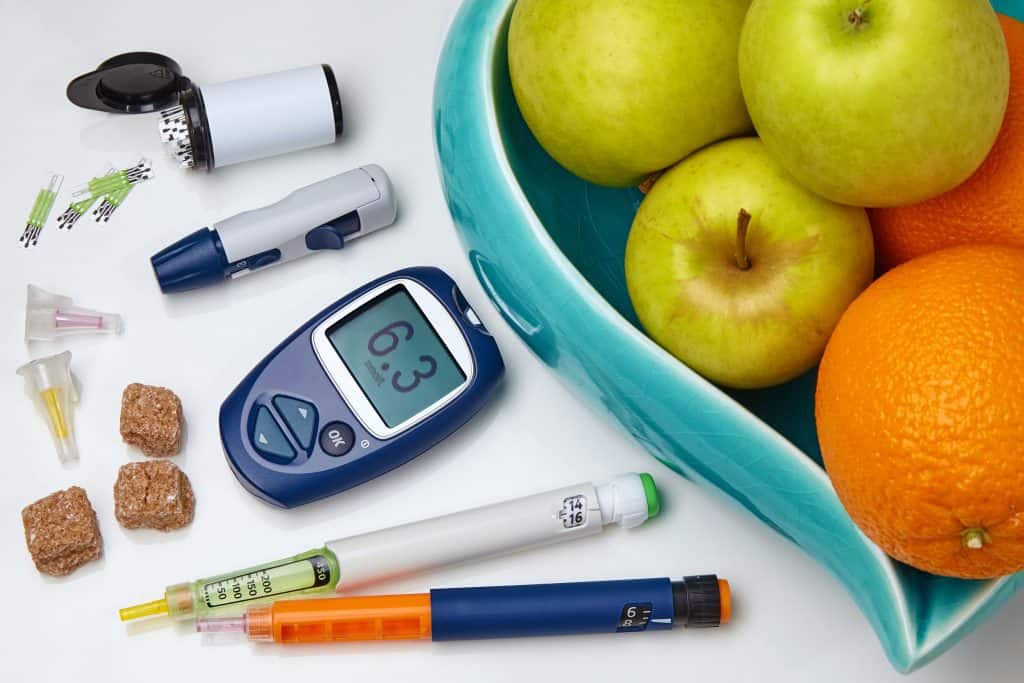Fruits for Gestational Diabetes, Simple List and Portions – A Guide
Posted by Prescription Hope - See Editorial Guidelines (Last Updated On: Mon Jul 10 2023)
It’s crucial when pregnant to eat enough vitamins and keep our bodies healthy. So, it’s not surprising that many pregnant women are looking to make sure they eat enough of the right foods. This includes fruits for gestational diabetes.
So, in this article, we’re going to take you through the fruits safe to eat to help with the control of gestational diabetes.
Fruits for Gestational Diabetes: Portion-controlled fresh, frozen, and canned fruits are ok to eat as long as they have no added sugar. Fruit juice and smoothies should be avoided as they contain higher amounts of added sugar. Fruit naturally has carbohydrates that can raise blood sugar levels, but they also have important vitamins and minerals.
The vitamins in vegetables can help your body cope with pregnancy demands, but what about fruits? You might be wondering which are good fruits for gestational diabetes?

Here’s a quick reference table of fruits, with more outlining information below.
| Fruit Type | Portion Size (approx.) |
|---|---|
| Strawberry | 1¼ cup |
| Apple | ½ medium-sized |
| Melon | 1 cup cubed |
| Blackberry | 1 cup |
| Grape | 17 small |
| Blueberry | ¾ cup |
| Banana | 1 small |
| Raspberry | 1 cup |
| Cherry | 10 average-sized |
| Plum | 1 average-sized |
| Peach | 1 average-sized |
| Grapefruit | ½ medium-sized |
| Orange | ½ medium-sized |
| Pear | 1 average-sized |
With this summary in mind, let’s start with an overview of gestational diabetes and what it means, so we can more easily understand more about fruits we can eat if diagnosed with gestational diabetes.
Overview of gestational diabetes

For a more in-depth view, we have an entire article about gestational diabetes here.
In short, diabetes that occurs during pregnancy is known as gestational diabetes or GDM (gestational diabetes mellitus).
According to experts who have studied it further, gestational diabetes is increasing in prevalence in line with the increase in the prevalence of obesity in women of childbearing age.
Women with a history of GDM are also at an increased risk of developing type 2 diabetes in the years following their pregnancy and their children have a higher risk of developing obesity and diabetes early in life.
From this study, we can see how important it is to make sure we eat a healthy diet, including fresh fruit, to combat the effects of gestational diabetes.
So for those looking at the profile of many common fruits to determine which ones are safe to eat if you have gestational diabetes, let’s discover more about who is in more danger of getting gestational
Who is prone to gestational diabetes?
The risk of diabetes in pregnancy does considerably vary according to race and ethnicity.
Hispanic and Asian women generally have higher rates of gestational diabetes.
It’s also worth noting that black and Hispanic women have higher rates of type 1 or type 2 diabetes during pregnancy.
How prevalent diabetes is in pregnant women varies worldwide and even within a country’s population, depending on the racial and ethical compositions.
As an example, in the US, there are fewer cases among Caucasian women compared to women that are:
- African American
- Hispanic American
- Native American
- Pacific Islanders
- South or East Asian
Now that we’ve looked into the background of gestational diabetes let’s start by discovering more about whether it’s ok to eat fruit if you have gestational diabetes.
Can I eat fruit if I have gestational diabetes?
It’s fairly common to question which fruits you can eat if you have diabetes.
The main reason for this is because fruit contains carbohydrates and a form of natural sugar called fructose, which can raise your blood sugar levels.
But by choosing wisely, fruit can still be a part of your daily eating plan when you have gestational diabetes.
The benefits of fruit are in its vitamins, minerals, and powerful plant compounds called phytochemicals.
Many people with diabetes understand the importance of the glycemic index (GI) and wonder how that might affect eating fruit with diabetes in pregnancy.
Do fruits score well on the glycemic index?
If you have diabetes, it’s useful to understand the glycemic index because eating foods with low GI ratings can help control blood glucose.
However, other factors must also be taken into account. The amount of carbohydrates you consume has the greatest influence on blood glucose levels, not just a food’s glycemic index.
It’s also important to eat a healthy, balanced diet that is low in fat, sugar, and salt, and high in fruit and vegetables.
If you’ve been advised to make changes to your diet or need advice, a diabetes dietitian can help you work out a diet plan. Speak to your doctor about being referred to a dietitian.

Why should you eat fruit when you have gestational diabetes?
Thanks to phytochemicals, eating fruit may lower your risk of heart disease, cancer, and stroke and boost your overall health. That’s important because diabetes is linked to a higher risk of heart disease and other problems.
Many fruits are also high in fiber.
Fiber slows digestion, helping to prevent blood sugar spikes common in those with gestational diabetes and other forms of diabetes.
Fiber can also make you feel fuller, which can help you keep a healthy weight.
The best choice is fresh fruit and frozen or canned fruit that does not have added sugars. Check the food labels for added sugar, and be aware that sugar can have many different names on the label.
Other names for sugar include:
- Cane sugar
- Dextran
- Invert sugar
- Corn sweetener
- High fructose corn syrup.
Recommended fresh fruits for gestational diabetes include:
- Strawberry
- Apple
- Grape
- Blueberry
- Cherry
- Plum
- Peach
- Grapefruit
- Orange
- Pear
Experts agree that eating whole fruits, including apples, blueberries, and grapes, is associated with a lower risk of developing type 2 diabetes.
How much fruit should I eat if I have gestational diabetes?
The serving size of each fruit does depend on its carb content.
On average, one serving of fruit contains about 15 grams of carbs. As a guide, a portion of fresh fruit fits into the palm of an adult hand.
Fruit servings that have about 15 grams of carbs include:
- 1 small piece of fresh fruit (4 ounces)
- ½ cup of canned or frozen fruit (no sugar added)
- 2 teaspoons of dry fruit such as dried cherries or raisins
Below are some serving sizes that contain approx. 15 grams of carbohydrates:

- 1¼ cup fresh strawberries
- ½ medium-sized apple
- 1 cup cubed melon
- 1 cup blackberries
- ¾ cup blueberries
- 1 small banana
- 17 small grapes
- 1 cup raspberries
Fruits to avoid – gestational diabetes
Although fresh fruit has plenty of benefits in terms of vitamins and minerals for both those with gestational diabetes and those without, there are some types of fruit and ways of eating fruit that you should avoid.
For example, smoothies tend to have extra additives that can lead to increased blood sugar levels. Not to mention that it can be very easy to overconsume on smoothies, increasing your calorie and carbohydrate intake.
Depending on how the smoothie is made, it may have less fiber than just plain fruit. Fruit juices also have much fiber removed.
Having less intact fiber means that fruit juices and smoothies are not as beneficial to the body as whole fruits. Therefore, the following forms of fruit should be avoided if you have gestational diabetes:
- Canned fruit with sugar
- Fruit juices and smoothies
- Any frozen fruit with added sugar
Here’s our list of the five fruits diabetics should avoid.
Related articles
You might also benefit from the relevant articles below:
12 Foods that lower insulin levels
Hardest part about being diabetic
Living with and managing diabetes

Final thoughts
We hope this has provided a good overview of fruits for gestational diabetes. If you’re diabetic, then we may be able to assist you further when it comes to your medications.
For more questions regarding your specific condition, always consult your healthcare provider.
If you’re having trouble affording any of the medications you’ve been prescribed, visit our home page to learn more about Prescription Hope’s medication access service, compare the costs of your current prescriptions, and see how we can help obtain your medications at a cheaper price. Fill out an application today and start receiving Brand-Name prescription medications at your doorstep. Call us at 1-877-296-HOPE (4673) to speak to one of our representatives, we’re always happy to see how we can help.
ENROLL



